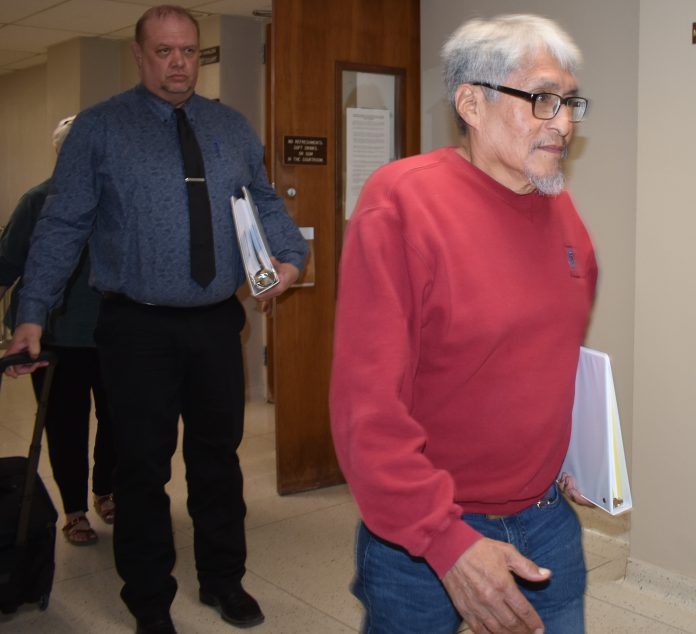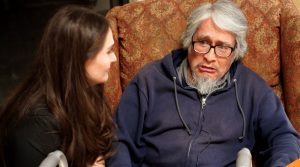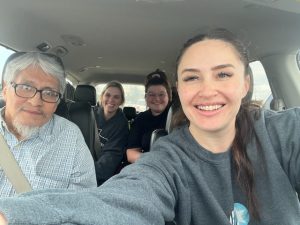
The first hint Friday’s hearing before Ector County District Judge Denn Whalen was going to be unusual came when the first witness was called. As Odessa Police Department Chief Mike Gerke walked past the defense table, he exchanged wide smiles and waves with the defendant, James Harry Reyos.
Not too much later, retired judge and former Ector County District Attorney John Smith approached the defense table and gave Reyos a big hug.
“This is probably breaking the rules, but I’m going to any way,” Smith said as he leaned in for the embrace.
More than four hours later, Whalen concluded the hearing by remarking it was likely the first-ever hearing of its kind in Ector County.
Reyos, 66, was convicted of beating Rev. Patrick Ryan, 49, to death at the Sage and Sand Motel in Odessa by an Ector County jury in June 1983 and sentenced to 38 years in prison. He served 20 years before being paroled.
On Friday, attorneys from the Innocence Project of Texas put on witness after witness who testified there is absolutely no way Reyos could be responsible for the Dec. 21, 1981 death of the Denver City priest.
More over, they said, there is evidence linking three dead men to the murder.
Reyos said the entire day felt surreal to him.
“I’m feeling happiness because they all came forward and are giving me support. They believe in my innocence,” Reyos said.
Seeing Smith and hearing his testimony was the “icing on the cake,” Reyos said.
Reyos hadn’t seen Smith since shortly after his trial.
“We both look a little different than we did 40 years ago,” Smith remarked following their hug.
Gerke was the first witness. He was then followed by OPD Sgt. Scottie Smith, fingerprint analyst Stacy Cannady and retired Texas Ranger Brian Burney.
According to court testimony, Reyos and Ryan were both living in Denver City in December 1981 when Ryan gave Reyos a ride to his impounded truck in Hobbs, N.M., on the morning of Dec. 21, 1981.
The next morning a maid found Ryan’s battered body, his arms tied behind his back, inside the motel room he’d rented under a false name using a false license plate number. A silver chalice and an accordion were missing from the room and never found.
The Ireland native’s stolen car was found at a Moose Lodge in Hobbs, N.M., and his wallet and a bloody credit card was found at a nearby gas station.
Eleven months later, a drunk and stoned Reyos, 27, called Albuquerque police and confessed to having killed the 49-year-old priest, with whom he’d had a sexual encounter. He then recanted.
On Friday, John Smith testified he and his fellow defense attorney, John Cliff, were “shocked, infuriated and nonplussed” at the jury’s guilty verdict and sentence. He suspects they chose to convict Reyos because of his homosexuality, which they had tried unsuccessfully to keep out of the trial.
Reyos’ conviction was affirmed in November 1984, but in December 1991, the prosecutor who represented the state during the appellate process came to the conclusion Reyos was innocent. That attorney, Dennis Cadra, sent a letter to then Gov. Ann Richards asking for Reyos’ conviction to be overturned. His widow, Yvonne, attended Friday’s hearing.
Cadra’s attempts to get the conviction overturned were unsuccessful, but his attempts started a snowball effect.
Ryan’s supervisor, a bishop, came out in support of Reyos, as did members of both the New Mexico and Texas Legislatures. Journalists from the Austin American-Statesman and Houston Chronicle wrote about the case. A book was published and A&E did a segment on Reyos. His plight was also featured on numerous podcasts.
Gerke testified his son, daughter-in-law and daughter came to him last year after listening to a podcast about Reyos’ case and asked detectives to pull the file.
After reading it, Gerke said he wondered where the rest of the file was because there wasn’t any evidence to support Reyos’ conviction. Not only was there no physical evidence linking Reyos to the crime scene or Odessa, there was actually evidence proving he was in New Mexico at the time of the murder.
Gerke asked detectives in his office to go over the file, too, and when they came to the same conclusion, they brought in the Ector County District Attorney’s Office.
OPD’s Sgt. Smith reminded Whalen of the evidence Smith and Cliff presented at Reyos’ trial.
While it’s unclear from court transcripts exactly when Ryan died, they know he died between 5:30 p.m. and 11 p.m. Dec. 21, 1981, the sergeant testified.
Reyos has a confirmed alibi for 6 p.m. to 8:30 p.m. that night; he was in Roswell with a friend and at midnight he was receiving a ticket west of Roswell for speeding, Smith said.
Since it’s 3 hours and 20 minutes from Roswell to Odessa, there’s no way Reyos could have made it from Roswell to Odessa back to Roswell in that time frame, the sergeant said. An added wrinkle to the timeline is Reyos couldn’t drive two vehicles at once and Ryan’s car was found in Hobbs.
Cannady offered Whalen the day’s bombshell testimony.
While everyone believed all of the fingerprints lifted from the crime scene had been destroyed, she found 11 fingerprint cards and photos of six latent prints. Seven of the fingerprint cards could be entered into a FBI database that didn’t exist in the early ’80s.

Thanks to a combination of the new technology and old-fashioned eyeball comparisons, Cannady said she was able to determine that a bloody fingerprint on the inside of the motel room door matches that of Charles Burkart; a bloody thumbprint left on a shower head matches Bobby Collins and a fingerprint left on a plastic cup matches that of Gary Ehrman.
In addition, Cannady testified she could eliminate Reyos, Ryan, Burkart and Ehrman as the person who left a fingerprint on the cruise control of Ryan’s car, but she could not eliminate Collins. The same is true of the bloody print left on Ryan’s discarded credit card.
Given the level of violence in the room, it’s highly unlikely Reyos wouldn’t have left any prints, Cannady said.
Sgt. Smith testified all three men were living in Odessa at the time of the murder and Ehrman registered at the motel an hour after Ryan. He also told Whalen, Collin’s sister and daughter both told him Collin, a former U.S. Marine, came back from Viet Nam a violent man.
Collin’s daughter told him she wouldn’t be surprised if he had committed the murder, saying, “I know he’s killed more people than he did in Viet Nam,” Smith said.
Whalen also heard testimony from Tyler, Texas, resident Alison Sterken. She said she wanted to make the 16-hour round trip to Odessa because Reyos was sent back to prison for four years on a parole violation charge she feels guilty about.
Sterken said in April 2008 she was confronted by a flasher while running in the early morning hours and Reyos was arrested as a result. She testified she told the officers the flasher was roughly 6 foot, 3 inches tall compared to Reyos’ 5 foot, 6 inches, but they insisted on arresting him anyway.
She later sent a note to the Innocence Project of Texas asking if she could help in any way.
“I felt a lot of guilt for not speaking up more loudly or more adamantly,” Sterken said. “He lost four more years of his life.”
At the end of the testimony, Barber and defense attorney Allison Clayton both asked Whalen to go to the Texas Court of Criminal Appeals and ask for Reyos to be exonerated.
At the end of the hearing, Whalen commended Gerke, Sgt. Smith and Burney for the lengths they’ve gone to in the case when they didn’t have to. He also expressed his appreciation for Sterken and John Smith’s testimony and thanked Clayton and her team for their professionalism. Their presentation will make it “easy” to consider the matter, he said.
Clayton said Friday was definitely a memorable moment.
“It’s very special when you sit next to somebody who’s waited for something good to happen for so long. I feel like it must be surreal for them, but I know that whenever you start hearing people say things like ‘We recognize that you’re innocent. We recognize you’ve been wrongly convicted,’ that matters,” Clayton said.
The fact that so many officials from Ector County testified on behalf of Reyos’ behalf, made it that much more incredible, she said.
“James got very emotional. He was over there crying,” Clayton said. “I just wanted to give him a hug and say, ‘Come on, we got this,’, but you’ve got to stay focused on your job, which is the most important thing in that moment.”
After the hearing, Clayton said she noticed Reyos had jotted down the words Whalen said about the hearing being the first of its kind and repeatedly circled it.
“He said, ‘Did you hear that? When the judge said this?’ And I said, ‘Yeah, James, I heard it’ and he repeated it to me. ‘There’s never been a hearing like this before in Ector County before,’” Clayton said.
Clayton said Thursday night was the first time her clients had seen pictures of the three men authorities now believe killed Ryan. She was flipping through a binder of evidence and spotted their photos.
“He looked at me and said, ‘Why did they do this?’” before dissolving into tears, Clayton said.
Asked about that moment, Reyos said he still doesn’t understand how anyone could be that vicious.

However, Reyos insists he’s not angry over the injustice he suffered or the fact they escaped justice.
“I don’t have any grudges against them for anything. I know God is going to be the ultimate judge. All I can do right now is pray for them, that God will have mercy upon them for that they did. That’s all I can do. I’m not God, but I can be an intercessor for them,” Reyos said.
After Clayton gets transcripts of Friday’s hearing, she said she and Barber will collaborate on a proposed document for Whalen to sign stating the “findings of fact and conclusions of law.”
If Whalen agrees Reyos should be exonerated, that document will then be forwarded to the Court of Appeals for its consideration.
Cadra’s wife, Yvonne, said her husband would have been so happy to know the case has reached this point.
“Everything was about justice to him,” she said.



